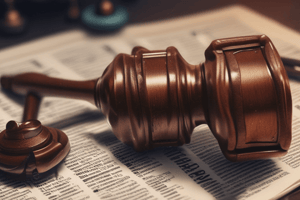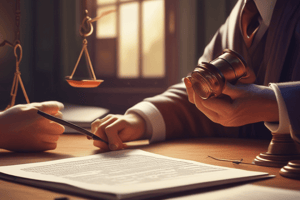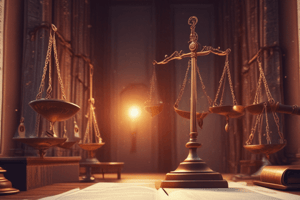Podcast
Questions and Answers
Which of the following accurately describes the state according to Charles Tilly?
Which of the following accurately describes the state according to Charles Tilly?
- A group with the sole purpose of public service.
- A coercion-wielding organization that imposes authority. (correct)
- An economic entity serving the bourgeoisie.
- A temporary organization focused on governance.
What is a key characteristic that distinguishes a state from a government?
What is a key characteristic that distinguishes a state from a government?
- Government can enforce laws, while the state cannot.
- A state is always democratic.
- Government has a permanent population.
- A state has defined borders. (correct)
Which activity is NOT typically associated with the functions of a state?
Which activity is NOT typically associated with the functions of a state?
- State making.
- Providing public entertainment. (correct)
- War making.
- Protection.
In which type of government is the executive primarily accountable to the legislature?
In which type of government is the executive primarily accountable to the legislature?
Which of the following statements aligns with the Marxist view of the state?
Which of the following statements aligns with the Marxist view of the state?
What defines sovereignty in the context of a state?
What defines sovereignty in the context of a state?
Which scenario illustrates a potential merging or disappearance of states?
Which scenario illustrates a potential merging or disappearance of states?
What is the primary function of the legislative branch in a government?
What is the primary function of the legislative branch in a government?
What characterizes an absolute monarchy?
What characterizes an absolute monarchy?
Which statement best describes a constitutional monarchy?
Which statement best describes a constitutional monarchy?
What is a characteristic of a military government or junta?
What is a characteristic of a military government or junta?
How does a unitary system of government primarily function?
How does a unitary system of government primarily function?
What is a significant disadvantage of a unitary system of government?
What is a significant disadvantage of a unitary system of government?
What differentiates political power from authority in a government?
What differentiates political power from authority in a government?
Which of the following statements is a function of the branches of government?
Which of the following statements is a function of the branches of government?
What is a common feature of non-democratic government types?
What is a common feature of non-democratic government types?
What distinguishes a government from a state?
What distinguishes a government from a state?
Which of the following is a characteristic of direct democracy?
Which of the following is a characteristic of direct democracy?
In a representative democracy, how do citizens exert control?
In a representative democracy, how do citizens exert control?
What is the primary function of the legislative branch of government?
What is the primary function of the legislative branch of government?
Which of the following best describes the nature of the state?
Which of the following best describes the nature of the state?
What role does the judicial branch play in government?
What role does the judicial branch play in government?
Which of the following is not a form of democratic government?
Which of the following is not a form of democratic government?
What is an essential characteristic of a non-democratic government?
What is an essential characteristic of a non-democratic government?
Flashcards are hidden until you start studying
Study Notes
Definition of State
- Defined as a "coercion-wielding organization" by Charles Tilly.
- Unique ability to impose authority, maintain order, and provide public goods.
Activities of the State
- War Making: Eliminating external threats outside territory.
- State Making: Eradicating internal rival forces and insurgents.
- Protection: Safeguarding populations from potential threats.
- Extraction: Securing resources, such as taxes, to support previous activities.
Ends-Related Definitions
- Emphasis on the aims and purposes of the state.
- Marxist theory views the state as serving the interests of the bourgeoisie, describing it as a "committee for managing the common affairs of the whole bourgeoisie."
Characteristics of the State
- Permanent Population: A stable community of citizens.
- Territory: Defined geographic borders.
- Government: An organized authority and structure.
- Sovereignty: Ultimate authority and power within its territory.
Scenarios of State Disappearance/Merger
- Potential scenarios include Taiwan merging with China, North and South Korea, East African Federation, etc.
- Mentioned examples like Ukraine to Russia and the United Kingdom.
Definition of Government
- Comprises people and organizations exercising executive, legislative, and judicial powers.
- Considered a temporary institution subject to change through elections and political processes.
Components of Government
- People: Elected officials and public servants.
- Power: Legislative (law-making), Executive (law enforcement), Judicial (law interpretation).
- Policy: Decisions made to achieve government goals, including laws and programs.
Difference Between State and Government
- Government is temporary; the state is permanent.
- All citizens are part of the state, but not all are members of the government.
- States can have different government forms, yet the state's essential characteristics remain constant.
Forms of Government
- Democratic: Direct and representative democracy, and constitutional democracy.
- Non-Democratic: Monarchies (absolute and constitutional), military governments (or junta).
Key Differences in Democratic Forms
- Direct Democracy: Citizens vote directly on policy initiatives.
- Representative Democracy: Citizens elect representatives to make decisions on their behalf.
Types of Monarchies
- Absolute Monarchy: Monarch holds significant power with weak constitutional limits.
- Constitutional Monarchy: Monarch's powers are regulated, serving mainly as a figurehead.
Military Government
- Characterized by military control, often arising from a coup.
- Typically authoritarian, enforcing policies without constitutional constraints.
Systems of Government
- Unitary System: Central government holds all authority, with subordinate subnational governments operating under it.
- Final decision-making authority resides with the national government.
Advantages and Disadvantages of a Unitary System
- Advantages:
- Streamlined legislative processes.
- Easier economic management.
- Disadvantages:
- Slower government response during emergencies.
- Lack of local emergency response capabilities; national troops may be needed.
Studying That Suits You
Use AI to generate personalized quizzes and flashcards to suit your learning preferences.




